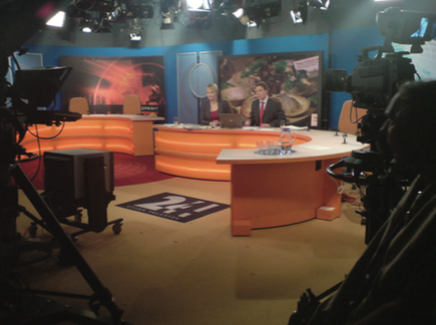“The revolution will not be televised,” Gil Scott Heron sang in his razor-sharp 1974 criticism of mainstream US media. His words have since traveled well beyond American borders and, if it is up to the regional powers that be, the revolution will indeed never be televised, nor will television ever be revolutionized.
In a remarkable show of solidarity, on February 12 of this year 22 Arab Ministers of Information signed the charter “Suggested Guidelines and Principles for Organizing Satellite TV in the Arab World.” The text stipulates, among other things, that satellite broadcasters are not to offend Arab leaders, national and religious symbols, nor to damage social harmony, national unity or public order. They should show respect for the Arab family structure and refrain from broadcasting anything which calls into question God and religion, while protecting Arab identity from the harmful effects of globalization.
The charter governs all existing and future agreements with TV stations. If broadcasters do not comply, the states party to the agreement can take punitive steps, varying from issuing a warning to confiscating material and equipment and, ultimately, canceling the station’s permit.
The text was immediately condemned by media observers as an attempt to enhance censorship. Reporters Without Borders defined it as “not only repressive but also retrograde… the Arab League information ministers have banded together to put pressure on news media that have been annoying them and escaping their control.”
Of the 22 countries represented at the meeting, only Qatar abstained from voting, which should not come as a surprise, as the charter is widely believed to particularly target two channels that have been a thorn in the side of many rulers: Lebanon-based Al-Manar and, especially, Qatar-based Al Jazeera.
Al Jazeera has been (temporarily) banned from many Arab countries, including Egypt, Iraq and Saudi Arabia, while Washington accuses the channel of fanning anti-
Americanism. In 2004, two British MPs leaked a secret memo in which George Bush suggested to Tony Blair to bomb the Al Jazeera premises. Israel joined the choir in March accusing Al Jazeera reporters of being pro-Hamas, banning them from interviewing government officials and entering Gaza.
The Arab information ministers stressed that the charter is of a non-binding nature and needs to be ratified by national authorities, which has so far only been done by the text’s mastermind, Egypt. The embattled Mubarak regime is determined to suppress anything that does not fit the pretty picture.
Thus, one newspaper editor was sentenced to six months in jail for questioning the Big Leader’s health, hundreds of activists and political opponents were imprisoned and the Britain-based al-Hiwar station on April 1 became the third channel to be banned from Nilesat.
Al-Hiwar founder Dr. Azzem Tamimi told media-watchdog Menassat that he was neither notified nor given an explanation. He believes, however, that the reason for pulling the plug were two programs that had been critical of human rights violations and media independence in the land of the Nile.
Of late, workers in Egypt’s all-important textile industry have gone on strike and, despite the overwhelming presence of Egyptian security forces, thousands of protesters regularly hit the streets, calling for the regime to step down. Yet if the state-run TV were to be believed, none of this ever took place.
Jordan has not yet ratified the charter, yet ended its first experiment with a private broadcaster before it had even started. After two years of preparations and numerous public announcements, ATV was finally to be launched on July 1, 2007. One day before D-Day, however, it received a letter from the semi-independent Audiovisual Commission (AVC), stating the launch was off, as the channel lacked a permit.
Now, call me suspicious, but that is weird. A private broadcaster starting a $30 million operation in a tightly controlled media landscape is not aware it lacked a permit? Even stranger is that none of Jordan’s state-owned newspapers or privately-run magazines covered the story. The only interviews with ATV Managing Director Mohannad Khatib I found were conducted with a portal called 7iber.com and… Al Jazeera.
Khatib claimed ATV had all necessary permits, yet admitted the channel had a financial dispute with the state-owned Jordan TV (JTV). Although mainly broadcasting via satellite, ATV had also leased one of JTV’s terrestrial channels for a staggering $3 million a year. JTV demanded payment for 2007, although ATV had not used the channel. In fact, it was JTV that had continued broadcasting. Interesting detail: the head of the AVC also heads JTV.
According to Khatib, the real reason for pulling the plug was that the Jordan authorities were becoming nervous about losing control over the message sent to the masses. While the rumor machine is in full swing, the truth will arguably never come out, as authorities and media continue to ignore the story as if it never happened. And thus the status quo prevails — ATV lacks a permit, JTV broadcasts despite deplorable ratings, and most Jordanians watch Al Jazeera, like the rest of the region.
Peter Speetjens is a Beirut-based journalist.










